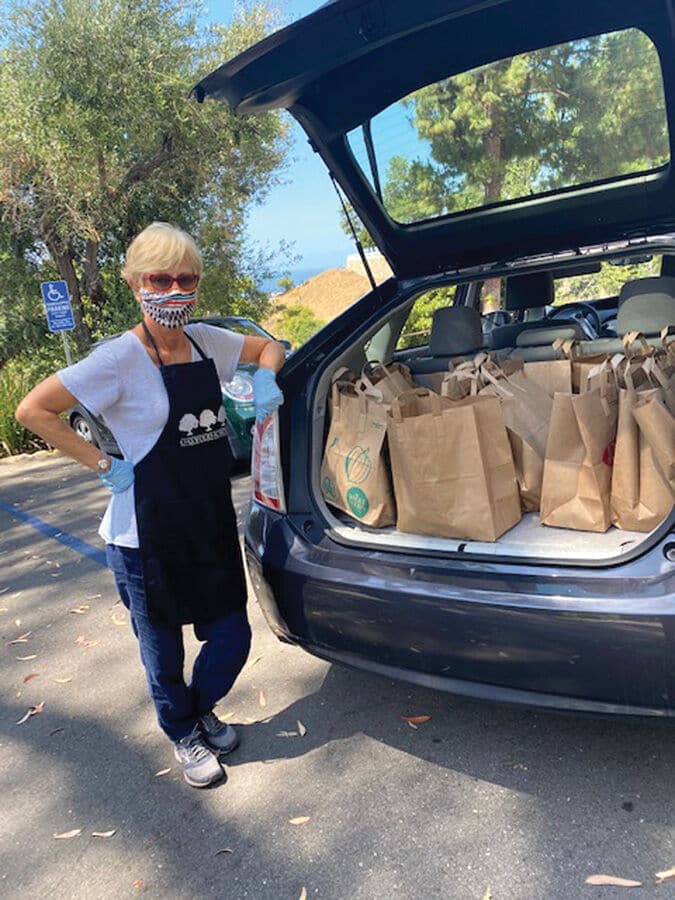Homelessness has become a hot-button issue in Malibu in recent years, as the numbers continue to climb despite efforts to get unhoused people into housing. And the problem isn’t going to get better any time soon. According to a recent study quoted by Bloomberg CityLab in July, the “economic disruption, housing instability and mass unemployment that COVID-19 has touched off in the U.S. could lead to a 45 percent spike in overall homelessness within one year.”
At the last Zoom Malibu Rotary Club meeting, attended by about 25 people, the local volunteer group CART (Community Assistance Resource Team) was invited to talk about the kinds of help it provides to Malibu’s homeless population. Board member and secretary Terry Davis spoke on behalf of the group.
CART was co-founded by local activist Carol Moss and Methodist minister Sandy Liddell about five years ago in response to the growing homeless population in Malibu. At the time, nothing was being done in the city to help the homeless except a weekly dinner at one of the churches and some clothing and necessities from the now-defunct Artifac Tree thrift store. The number of homeless people in Malibu has grown to 240, according to the 2020 official count.
In 2017, the City of Malibu began funding two full-time outreach workers for the homeless through The People Concern of Santa Monica, who get them into temporary and permanent housing situations—even bringing medical doctors to the field weekly. However, the rehoming process can take years, and in the meantime, the homeless are still on the street and have needs. That’s where CART comes in. CART partners with The People Concern and LA County to sponsor Homeless Connect Days at the old county courthouse, where agencies come together under one roof to get the homeless signed up for services. CART has also helped the homeless with free eye clinics, Woolsey Fire needs, COVID-19 testing (nearly all the homeless were negative), coordinating with homeless shelters in Santa Monica, handing out things like backpacks and bus passes on an as-needed basis and helping the newly homed with donated furnishings and household goods.
In addition, CART is working with the city on the safe parking project for homeless living in cars. Davis believes it’s possible the city could be sued if it doesn’t start providing some kind of overnight accommodation. However, she said, RVs would not be part of a safe parking program.
Some of CART’s activities have been on hiatus since the pandemic took hold, but the free meals are still going strong. With funding from local nonprofit the Malibu Foundation, they’re able to provide two free hot box lunches a week—and it’s quite a production.
“We have tremendous food donations from Whole Foods and the Malibu Farmer’s Market,” Davis said. She emphasized that very little of the donated food goes to waste, and they get very creative in figuring out how to use all of it. “It becomes a true adventure. We may get 20 boxes of pre-packaged salads, because salad bars are no longer allowed at the grocery store, and we figure out how to recombine them.”
Through Malibu Foundation’s support, the group hired a lunch chef who herself happened to be homeless in the past. “This is her passion,” Davis said. “And she does all the shopping and is a master bargain hunter. And now we also have to buy all this packaging because of the coronavirus. Sometimes the packaging is more expensive than the food.”
One volunteer picks up donated food; several volunteers help the chef with preparing the meals and then packaging everything up in containers and brown grocery bags. The meals are prepared in the commercial kitchen at the Serra Retreat Center, which has been donating the use of its facilities since the coronavirus outbreak. Other volunteers transport the lunches to the site where they are handed out to the homeless.
The homeless are usually lined up and socially distanced for the “grab-and-go” meals, and a volunteer spurts each of them with hand sanitizer. The lunches also provide an opportunity for the outreach workers to make new contacts and see existing clients.
In an interview, Davis said if she could “reach for the stars” and ask for anything, she would say that what CART needs most is a building—a site—”in the Malibu community where we can give shelter to up to 30 people who have signed up for homeless services, with access to computers and services and safe parking overnight. These are the things that enable people to get housed.”
Learn more at malibucart.org

